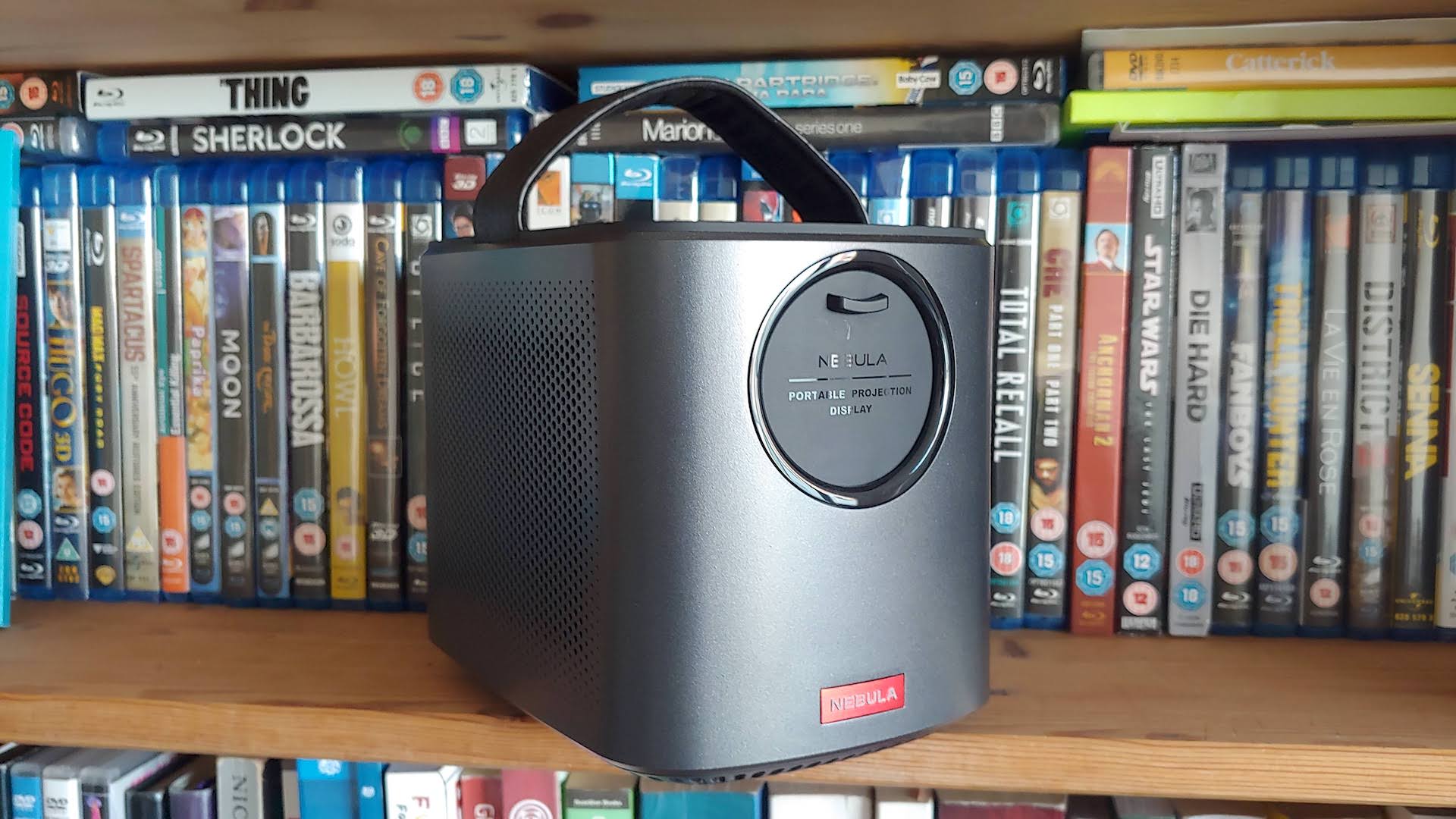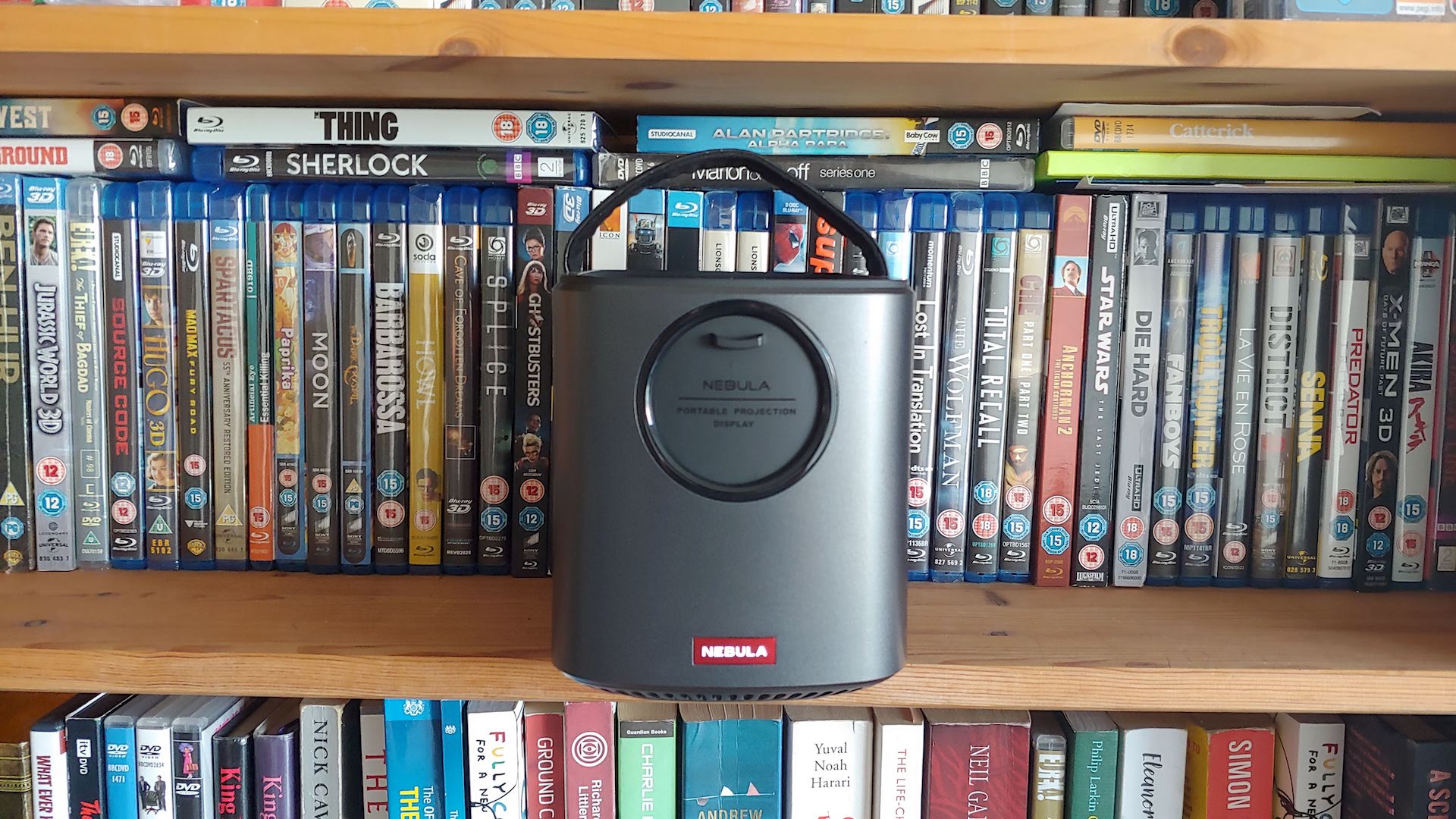TechRadar Verdict
The Anker Nebula Mars II projector is a fantastic gadget. While it’s not going to tempt cinephiles, those looking for an easy-to-use, easy-to-transport portable projector need look no further.
Pros
- +
Great portable design
- +
Android 7.1 built in
- +
Excellent speakers
Cons
- -
Not bright enough for daytime
- -
Proprietary charger
- -
No Google Play Store
Why you can trust TechRadar
A home cinema projector remains one of tech’s most tempting indulgences. Often the most affordable way to get giant-screen action into your home, they are however quite a commitment. Do you need to rearrange your furniture to accommodate it? Is there a screen or blank white wall easily accessible to project onto? Are the speakers up to scratch, or will you need to consider hooking up additional ones?
Projector installation can be a bit of a pain then. But Anker, best known for its portable mobile battery packs, is taking the fuss out of projection with its portable, Android-powered Nebula Mars II projector. It proves that a portable projector or outdoor projector is not only now feasible, but worth buying, too.

Price and availability
The Anker Nebula Mars II projector is available now, priced at £469.99 ($499.99, around AU$850).
That’s about the going rate for a decent portable pico projector, but the Nebula Mars II is far superior to the majority of similarly-sized rivals on the market. The only comparable product we'd similarly recommend is Anker's own Nebula Capsule projector (though the Mars II greatly refines that earlier offering).

Design
With its carry handle and dinky size, the Anker Nebula Mars II is about as portable a (functioning) projector as we’ve ever seen. Weighing just 1.79kg, we’ve played with larger Bluetooth speakers, making the boxy Nebula Mars II a superb option for those looking for an easy-to-transport projector.
The Anker Nebula Mars II projector looks a bit like a squashed cube, with its edges smoothly curved off. Around the front you’ll find the projection lamp, protected by a push down cover that also automatically turns the projector on when the lamp is exposed.

There’s a selection of hardware button controls on the top edge of the projector; volume controls, a source selector, Bluetooth pairing and a four-way directional remote with a selection button. There’s also four small white LEDs that show how much of the built-in 12,500mAh rechargeable battery is left.
Around the back you’ll find some ventilation openings (just like all projectors, the Nebula Mars II can get hot after prolonged use), as well as the DC-in for power, a HDMI-in port, a USB 3 port and an audio out jack. There’s also an IR sensor for using the included remote control with, along with a pin-sized reset button. The DC-in is one of the few gripes we have with the Nebula Mars II – it’s a proprietary power supply, where a USB charging option would have been much more convenient.

Either side of the box has speaker grille openings to help the Nebula Mars II deliver its impressive audio, while underneath you’ll find a rubber ring so that the projector doesn’t slip around on surfaces, as well as a point for screwing in a camera tripod.
All in black (apart from a small red Nebula logo on the front), including its leather handle, the Nebula Mars II projector is an unassuming and tidily designed box.

Features
For its size, the Nebula Mars II projector packs in an impressive spec sheet. While its 720p output won’t win any awards among cinephiles, it’s an acceptable resolution for projectors of this ilk, and the 300 ANSI Lumens lamp is excellent for night time viewing (and just about reasonable for low-lit surroundings).
You’ll get roughly ten-inches of screen size for every foot-or-so the projector is away from the surface its projecting on, up to an ultimate limit of 150-inches. You’ll find the sweetspot between size and projection clarity somewhere between 80 and 100-inches however we found, with performance best as you’d expect when in as close to pitch-black darkness as you can manage. You’ll get between 3 and 4 hours of video playback from the projector, though you can power from the mains if needed, too.

The speakers built in are enjoyable too. Using two 10W drivers and bass radiators of Anker’s own design, they go impressively loud and sound reasonably clear too. That’s particularly handy given the projector can be used as a standalone Bluetooth speaker too, where it’ll blast 30-odd hours of tunes on a single charge.
One of the most interesting features of the Nebula Mars II however is the fact that it runs a bespoke version of Android 7.1. Laying apps out in a tile format that apes (but shouldn’t be mistaken for) Android TV, that means you’ve got ready-to-go video sources, straight out of the box. With Wi-Fi connectivity built in, you can be streaming from Netflix, Amazon Prime or your Plex library within minutes of turning it on.
Anker’s forked build of Android is limited in the apps that it lets you use with projector, but at least all that we tried seemed to work well with the hardware. Remember – if you don’t want to stream, you can always hook up a player or video file from the HDMI and USB 3 ports respectively.
The projector comes with a physical remote, but you may find yourself more drawn to the free iOS and Android Nebula Connect app. This quickly pairs with your projector and as well as mimicking the hardware remote control, it also offer a mouse-cursor mode, which can be handy for controlling some apps.

Performance
Measure your expectations, and you’ll have a great time with the Nebula Mars II. It’s not bright enough for daytime use in any meaningful way, but when night falls, it’s a lovely bit of kit.
For starters, its portability makes for a transformative projection experience in terms of accessibility. I had it projecting everywhere from outside on my balcony to the foot of my bed and onto the white wall beyond with ease. The struggles to find a suitable spot are whisked away thanks to the built in battery, with a speedy and accurate auto focus and keystone adjustments letting you get creative as to where you’d like to settle down and watch a movie.

Picture quality is sharp enough to be enjoyable too. It’s not going to win awards against 1080p or 4K projectors, but offset against the portability factor, that’s a fair trade to make. We had a lot of fun hooking up a SNES Classic Mini, for instance, where pixelation was never a concern.
Audio quality is punchy too, and more than loud enough to serve the sort of spaces where a 100-inch screen is a sensible size. The quoted 4-hour battery life seems pretty accurate, too.

Where you may be a little disappointed is in the quality of the apps on offer through the Android fork. Netflix, Amazon and the like seem to have taken their eyes off whichever version of their apps that the Nebula Mars II is sporting, making them feel a little clunky compared to their smart TV or console variants. However, you’ve still got full access to their respective catalogues, making it a minor quibble.

Verdict
The Anker Nebula Mars II projector is a great addition to your on-the-go entertainment arsenal. Provided you’re not expecting to use it in daylight or bright meeting rooms, it delivers large, vibrant images and an excellent array of apps thanks to the Android platform it’s built upon. With a capacious battery and loud speakers, it’ll quickly become a party centerpiece, or flexible, movable DIY home cinema.
If the Anker Nebula Mars II projector is the best option for you, it's worth checking out out Anker promo codes for ways to save on your purchase.
- Don't miss our round-up of the best projectors 2018
Gerald is Editor-in-Chief of iMore.com. Previously he was the Executive Editor for TechRadar, taking care of the site's home cinema, gaming, smart home, entertainment and audio output. He loves gaming, but don't expect him to play with you unless your console is hooked up to a 4K HDR screen and a 7.1 surround system. Before TechRadar, Gerald was Editor of Gizmodo UK. He is also the author of 'Get Technology: Upgrade Your Future', published by Aurum Press.

